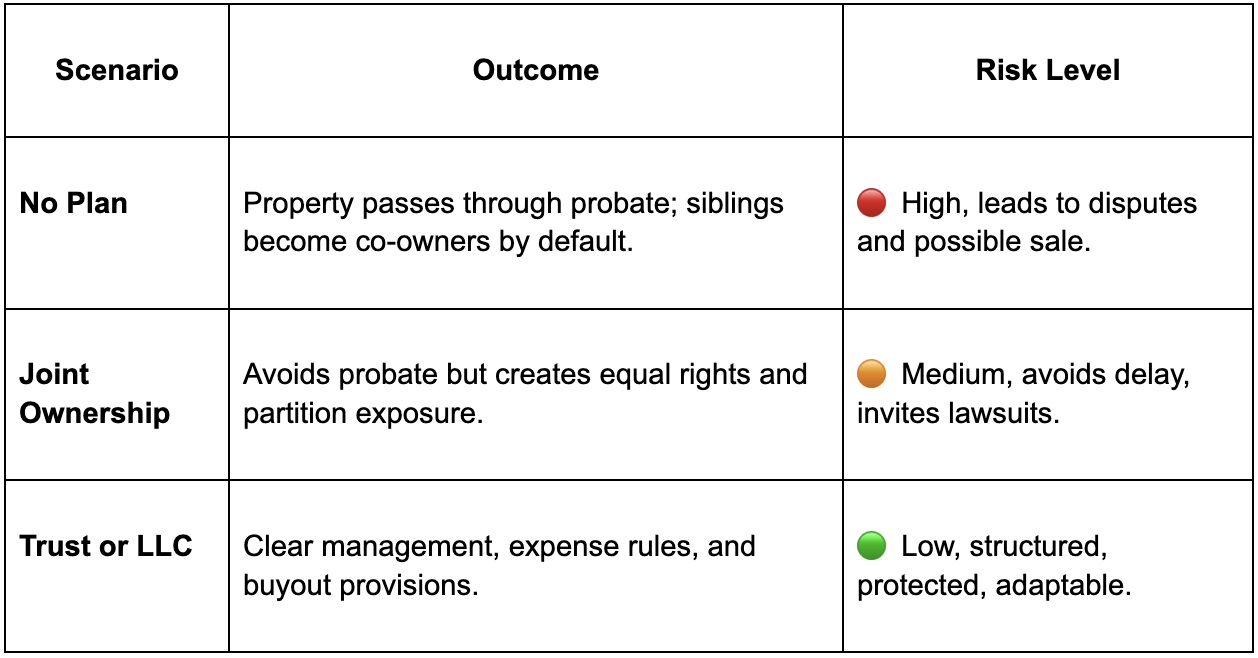Date:
November 3, 2025
Author:
Anastasia Fainberg
/
Founder & Managing Partner
The Family Cabin Dream, and Why It So Often Becomes a Nightmare
Your parents left you and your siblings the family cabin. At first, it feels like a gift, weekends in the Rockies, holidays just like before, kids chasing each other through the same halls you grew up in.
But within months, reality sets in. The tax bill lands. The roof leaks. Someone wants to rent it out for Airbnb income; someone else insists it should stay “family only.”
And under Colorado law, any co-owner can demand the entire property be sold through a court process called partition. That means even if most of the family wants to keep the cabin, one person’s frustration can bring everyone to court, and a judge will almost always order a sale.
What began as a legacy quickly becomes a lawsuit. In Colorado, joint ownership is not a plan. It’s a problem waiting to happen.
Why Colorado Families Clash Over Inherited Property
Colorado has one of the highest rates of second-home ownership in the country. From Estes Park to Breckenridge, families pass down cabins, condos, and ranches with the best of intentions, hoping to preserve memories and connection.
But Colorado law protects ownership rights, not family harmony. When property passes to children “in equal shares,” they become tenants in common. Each sibling owns an undivided interest, with full rights to sell, transfer, or use their portion however they wish. That’s where the trouble begins.
Common Points of Conflict
Expenses
Taxes, HOA fees, insurance, and maintenance don’t divide themselves. One sibling pays more, another contributes less, and resentment grows.
Use
Who gets the cabin for Christmas? Or the Fourth of July? Equal ownership doesn’t mean equal time.
Improvements
Some want to keep the rustic charm; others want new appliances, flooring, or furniture. Who decides? Who pays?
Exit options
When one owner wants out, there’s no built-in mechanism for buyout or sale. The only legal option is partition, a process that forces everyone into court.
Colorado judges do not mediate family disagreements, they simply divide or sell the property.
The Hidden Costs of “Doing Nothing”
Families who assume they can “just share” the cabin often discover how fragile that idea is.
1. Financial stress grows.
Property taxes and upkeep for mountain homes can easily reach $10,000-$20,000 a year. One sibling’s financial setback becomes everyone’s problem.
2. Maintenance becomes personal.
When repairs are needed, like fixing a leaking roof or frozen pipes, there’s no clear rule for who pays. The sibling who fronts the cost may never be reimbursed.
3. Partition lawsuits are expensive.
Once filed, they’re nearly impossible to stop. Attorney fees and court costs can exceed $25,000. Most end in a forced sale, even if the family wanted to keep the home.
4. Relationships break down.
What parents saw as a symbol of togetherness often becomes a point of permanent division.
In our Denver practice, we’ve seen families lose both their cabin and their connection, all because no one set clear terms.

Case Study: “The Breckenridge Cabin” (Composite Scenario)
Three siblings inherited their parents’ ski cabin outside Breckenridge. One lived nearby and used it regularly. One lived in Texas and never visited. The third wanted to rent it for extra income.
At first, they agreed to “figure it out.” But within two years, expenses doubled, and communication broke down. The out-of-state sibling, feeling ignored, filed a partition action in Summit County Court.
The judge ordered the cabin sold. The sale price barely covered attorney fees and back taxes.
The siblings haven’t spoken since.
The law didn’t favor anyone, it simply enforced each person’s right to end joint ownership.
Understanding Partition in Colorado
Under Colorado Revised Statutes § 38-28-101, any co-owner of real property can request partition. If the property can’t be physically divided, like a cabin, it must be sold. The court appoints a referee to handle the sale, and the proceeds are split among the owners.
No consideration is given to family history or emotional value. To the court, it’s an asset, not an heirloom.
That’s why co-ownership without structure is one of the most dangerous estate planning mistakes Colorado families can make.
“Quick Fixes” That Make Things Worse
Many parents try to avoid probate by simply adding children’s names to the deed. It feels practical, until the consequences appear.
Why Adding Kids to the Deed Is a Mistake
- It exposes the home to your child’s creditors or divorce.
- It creates tax headaches, they lose the full step-up in basis when you pass.
- It doesn’t prevent partition. Co-owners can still force a sale.
- It locks in ownership disputes that can’t be undone without consent.
What feels like simplicity often invites conflict, taxes, and court.
Pro Tip: Avoid “DIY” title transfers. Learn how trusts or LLCs can provide structure and protection at with a Trust Attorney in Denver.
Better Ways to Protect Your Family Property
There are two main planning tools that help Colorado families preserve heirloom real estate: trusts and LLCs. Each has distinct advantages.
Trusts: Clear Rules, Flexible Control
A trust owns the property, not the siblings. The trust document becomes the rulebook, defining:
- How expenses are shared and paid
- Who manages the property (trustee)
- How scheduling and maintenance are handled
- When or how the property can be sold
Trusts also allow buyout provisions, letting one sibling exit without court involvement. Parents can even specify sale triggers, like all children agreeing, or after the next generation comes of age.
Most importantly, a properly funded trust avoids probate and keeps the property private.
LLCs: Treating the Cabin Like a Family Business
An LLC (Limited Liability Company) can also hold title to the cabin. Each sibling owns membership shares instead of the property itself. The LLC’s operating agreement sets the family’s expectations:
- Voting rules for major decisions
- Expense-sharing formulas
- Scheduling for use or rental
- Buyout or inheritance terms
- Dispute resolution procedures, without going to court
An LLC can even prohibit partition, forcing internal resolution instead of lawsuits. And because ownership passes through membership interests, not deeds, it’s much easier to manage over generations.
Learn more about how LLCs can stabilize family property transfers at Legacy Law Group Colorado.
Case Study: “The Buena Vista Ranch” (Composite Scenario)
A couple with three children placed their 80-acre ranch into a family LLC before they passed.
They appointed one child as manager and established annual use fees for maintenance.
When one child later needed to sell their share, the LLC allowed a buyout at appraised value, funded through the family trust. No one went to court. The ranch stayed in the family.
That’s the power of structure: clarity without conflict.
Colorado Realities Every Family Should Know
- High property values mean high stakes. A “modest” cabin may be worth $800,000 or more.
- Probate remains public and time-consuming. Even simple estates can take 6-9 months.
- Partition cases are common. Colorado courts see dozens each year, especially as multi-generational ownership expands.
- Estate tax laws are changing. The federal exemption drops in 2026, increasing the need for trust-based planning.
- Family expectations shift. Younger generations often can’t afford to maintain inherited homes without clear systems.
These are not rare issues, they are predictable outcomes when families don’t plan.
Side-by-Side: No Plan vs. Joint Ownership vs. Trust

Common Misconceptions
Myth #1: “We all get along. We’ll just share it.”
Life changes. New spouses, job moves, and financial pressures test even close families. A written plan protects relationships when circumstances shift.
Myth #2: “A will is enough.”
A will still sends property through probate. It doesn’t create management rules or prevent conflict among heirs.
Myth #3: “It’s not worth planning if the cabin isn’t worth millions.”
Middle-class families often suffer the most from unclear planning, because the property is their single largest asset.
Myth #4: “We’ll deal with it later.”
Later often means after someone passes, when it’s too late to decide together.
Why This Really Matters
Planning for heirloom property isn’t about legal documents. It’s about preserving connection. Your family’s cabin, ranch, or lake house carries stories, birthdays, holidays, laughter. Without a plan, those memories can become evidence exhibits.
With a plan, they remain a place to gather. Planning says: I value our family more than any deed. At Legacy Law Group Colorado, we help families turn emotional assets into protected legacies, using tools like trusts, LLCs, and coordinated family agreements.
How to Start
- Clarify who owns what.
Gather deeds, tax statements, and existing wills or trusts. - Talk about the future.
Have an honest family conversation about use, costs, and long-term intentions. - Explore your options.
Discuss trusts and LLCs with an estate planning attorney familiar with Colorado partition laws. - Build your rulebook.
Choose a structure that fits your family’s values, whether that’s buyout flexibility, generational preservation, or sale triggers. - Keep it current.
Review your plan every few years through a Client Care Program or LIFT Review to ensure it evolves with your family.

FAQs
What is a partition action?
A legal process where one co-owner can force the sale of jointly owned property. In Colorado, courts usually order a sale rather than a physical split.
Can we prevent a partition lawsuit?
Yes. Properly structured trusts or LLCs can prohibit partition and set up internal buyout mechanisms.
Does putting my child on the deed avoid probate?
It might, but it creates tax risks and exposes the property to your child’s creditors.
What happens if a sibling stops paying expenses?
Without an agreement, everyone is still responsible. In a trust or LLC, rules for contributions and reimbursements can be clearly defined.
Can we rent the property through Airbnb?
Only if your ownership structure allows it. Trusts or LLCs can specify rental policies to prevent conflict.
Do we need an appraisal before transferring the property to a trust?
It’s recommended. Accurate valuation helps with fair buyouts and future tax calculations.
Will this affect property taxes?
Not necessarily. Transfers to trusts or family LLCs are often exempt from reassessment if properly structured.
Can we include future generations?
Yes. Both trusts and LLCs can define succession rules for children and grandchildren, ensuring continuity.
How do we handle one sibling wanting out?
Build in buyout rights at fair market value, funded by insurance, reserves, or agreement among co-owners.
Is this only for wealthy families?
No. Colorado families of all means benefit from clarity. The goal isn’t wealth, it’s peace.
Closing Reflection
Heirloom property planning is not about control, it’s about care. When families protect the cabin, they protect the love that built it.
Whether your family’s mountain home is a Breckenridge retreat or a simple cabin tucked in the pines, structure transforms it from a future fight into a living legacy.






































